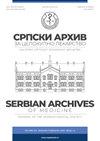塞尔维亚发现首例人类多房棘球蚴病病例
IF 0.2
4区 医学
Q4 MEDICINE, GENERAL & INTERNAL
引用次数: 1
摘要
介绍。多房棘球蚴引起多房性或肺泡性棘球蚴病,其临床表现与细粒棘球蚴引起的感染不同。多房绦虫最常见的最终宿主是狐狸和豺狼,而像狗和猫这样的家养哺乳动物则很少见。人类是罕见和偶然的中间宿主。人类囊性包虫病在塞尔维亚是地方性的,而更严重的肺泡包虫病尚未被记录。大纲。我们报告一位来自斯雷姆斯卡米特罗维察市一个小村庄的67岁女性病例。几年前开始出现症状,肝脏疼痛随着时间的推移而恶化。鉴别诊断包括肝良性肿瘤如血管瘤、囊性包虫病及囊性包虫病中形成的脓肿。行左外侧肝切除术,切除S II/III肝段。病理检查见大量空小囊泡,有几质膜,无原棘突,周围有大量纤维化,浸润性生长至肝实质,均为多房包虫病的标志。手术缘发现棘球蚴囊泡阳性,表明棘球蚴组织未完全切除。因此,阿苯达唑治疗被引入。流行病学调查显示,患者居住在多房棘球蚴病流行区,家中有2只猎犬,后院可能有狐狸粪便污染土壤。结论。这是塞尔维亚记录的第一例人类多房棘球蚴病,应提醒医学界改进预防和诊断程序以及外科技术,以更好地管理这种人畜共患疾病。本文章由计算机程序翻译,如有差异,请以英文原文为准。
The first human case of multilocular Echinococcosis recognized in Serbia
Introduction. Echinococcus multilocularis causes multilocular or alveolar echinococcosis, which differs from infection caused by Echinococcus granulosus in clinical presentation in humans. The most common definitive hosts for E. multilocularis are foxes and jackals, while domestic mammals like dogs and cats are rare. Humans are rare and accidental intermediate hosts. Cystic echinococcosis in humans is endemic in Serbia, while more severe alveolar echinococcosis has not yet been recorded. Case outline. We present a case of a 67-year-old female from a small village in the Sremska Mitrovica municipality. The onset of symptoms was several years ago, with liver pain which progressed over time. Differential diagnoses included benign liver tumors like haemangioma, cystic echinococcosis and abscess formed in the cystic echinococcal lesion. Left lateral hepatectomy was performed, and S II/III liver segments were removed. Pathological examination showed numerous small empty vesicle spaces with chitin membrane without protoscolices, surrounded by massive fibrosis and infiltrative growth into the liver parenchyma, all indicative marks of multilocular echinococcosis. Surgical margins were found positive for echinococcal vesicles showing that echinococcal tissue was not completely removed. Thus albendazole therapy was introduced. Epidemiological interview revealed that the patient lived in an endemic region of multilocular echinococcosis, in a house with two hunting dogs and backyard where contamination of soil with fox feces could occur. Conclusion. This is the first case of human multilocular echinococcosis recorded in Serbia, which should alert the medical community to improve prophylactic and diagnostic procedures and surgical techniques to better manage this zoonotic disease.
求助全文
通过发布文献求助,成功后即可免费获取论文全文。
去求助
来源期刊

Srpski arhiv za celokupno lekarstvo
MEDICINE, GENERAL & INTERNAL-
CiteScore
0.40
自引率
50.00%
发文量
104
审稿时长
4-8 weeks
期刊介绍:
Srpski Arhiv Za Celokupno Lekarstvo (Serbian Archives of Medicine) is the Journal of the Serbian Medical Society, founded in 1872, which publishes articles by the members of the Serbian Medical Society, subscribers, as well as members of other associations of medical and related fields. The Journal publishes: original articles, communications, case reports, review articles, current topics, articles of history of medicine, articles for practitioners, articles related to the language of medicine, articles on medical ethics (clinical ethics, publication ethics, regulatory standards in medicine), congress and scientific meeting reports, professional news, book reviews, texts for "In memory of...", i.e. In memoriam and Promemoria columns, as well as comments and letters to the Editorial Board.
All manuscripts under consideration in the Serbian Archives of Medicine may not be offered or be under consideration for publication elsewhere. Articles must not have been published elsewhere (in part or in full).
 求助内容:
求助内容: 应助结果提醒方式:
应助结果提醒方式:


